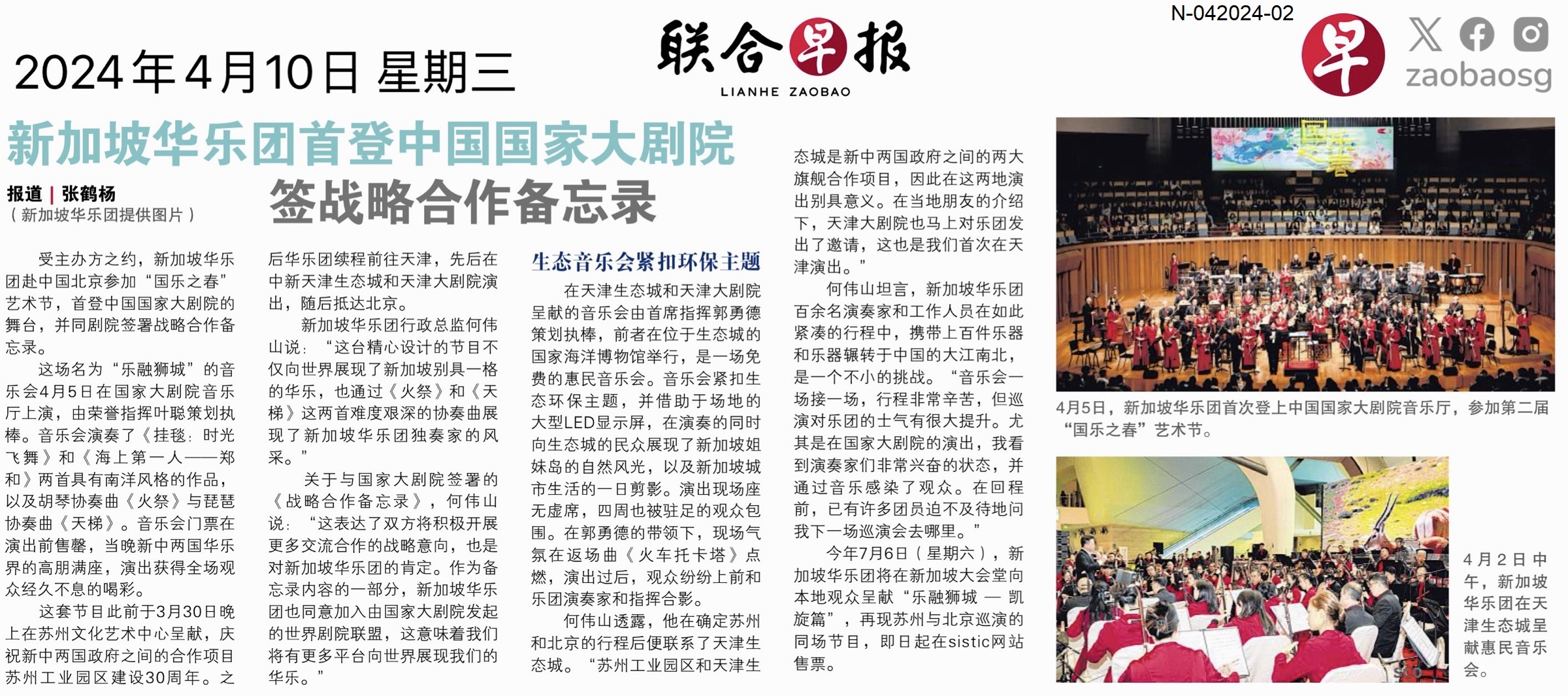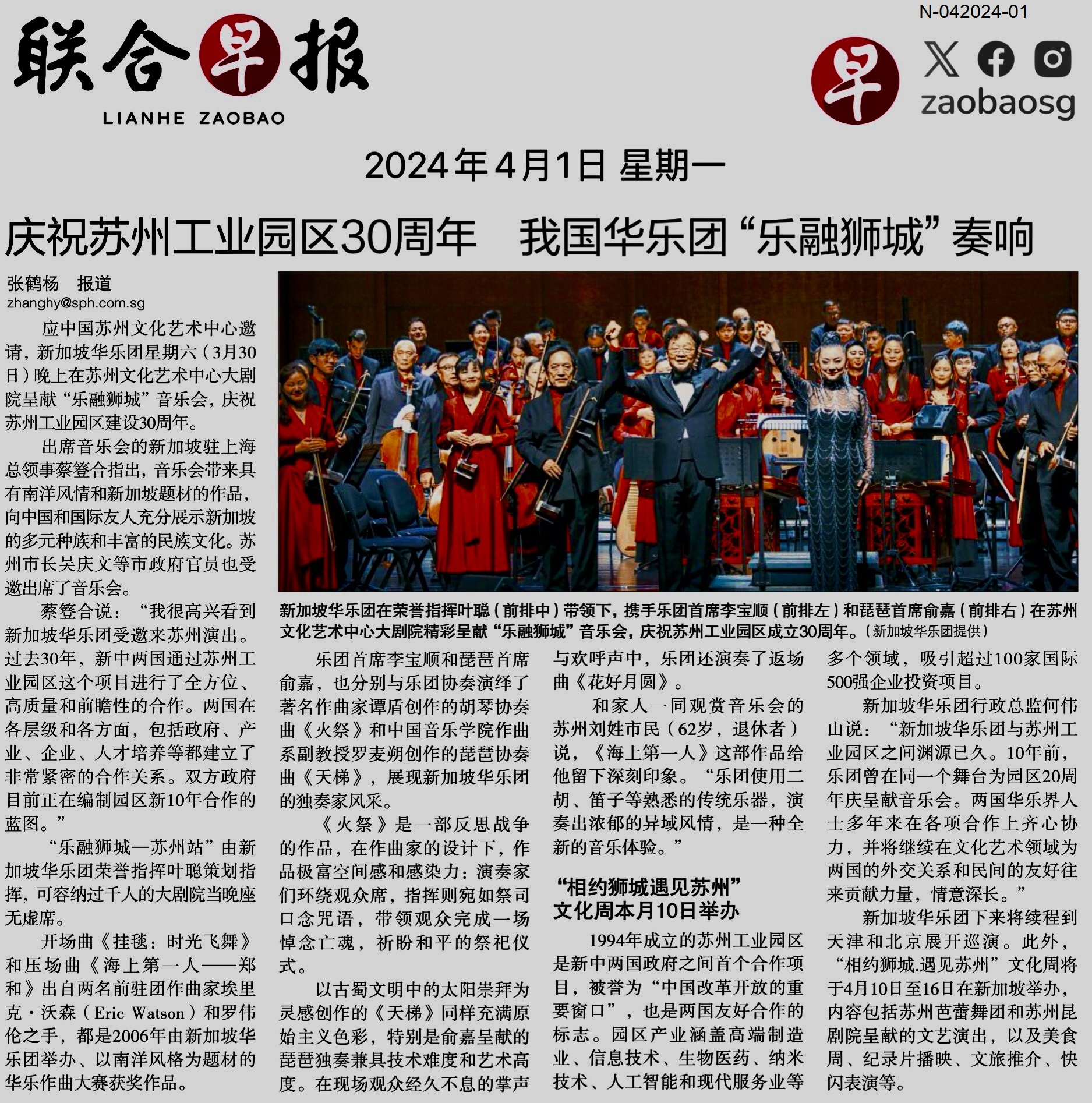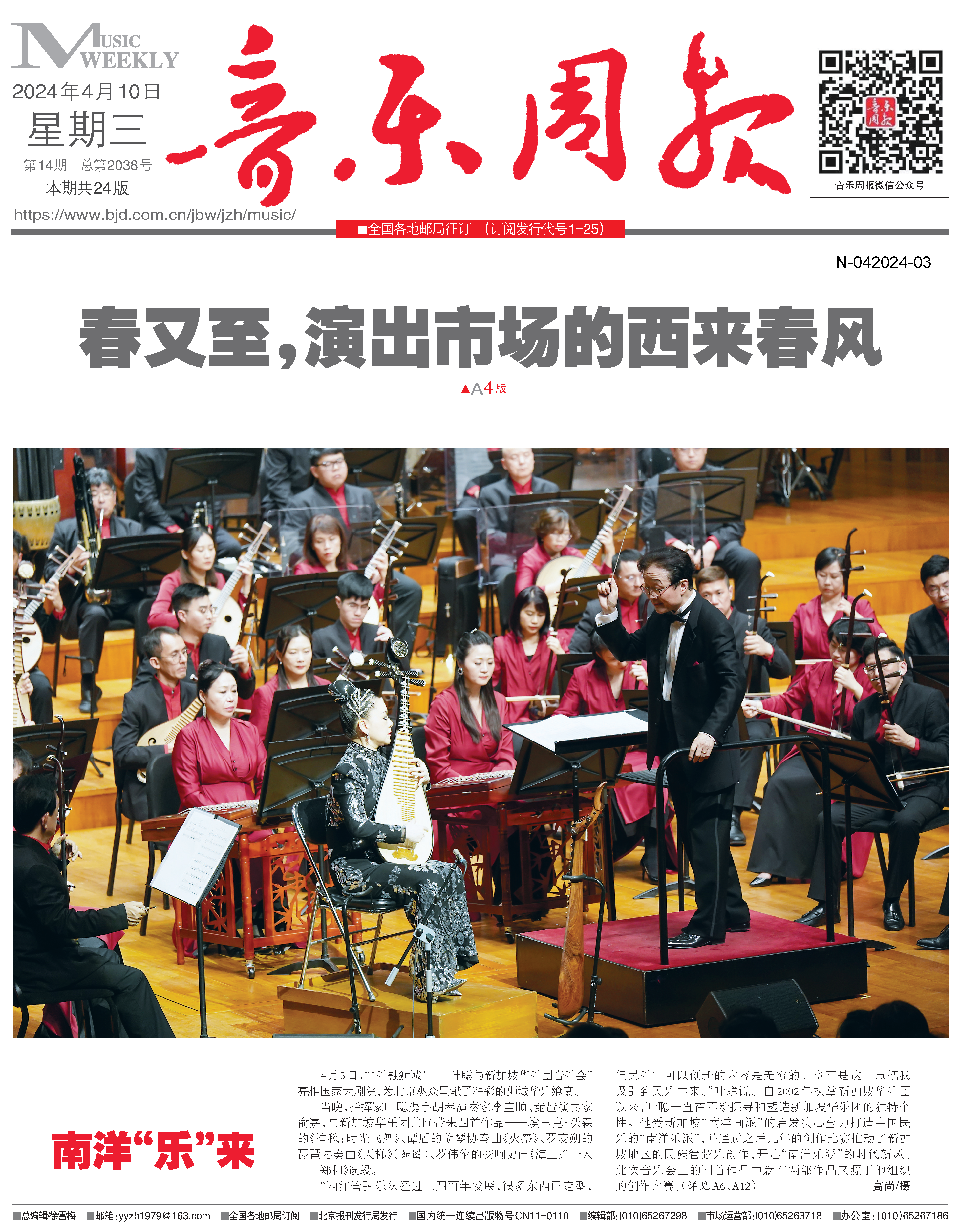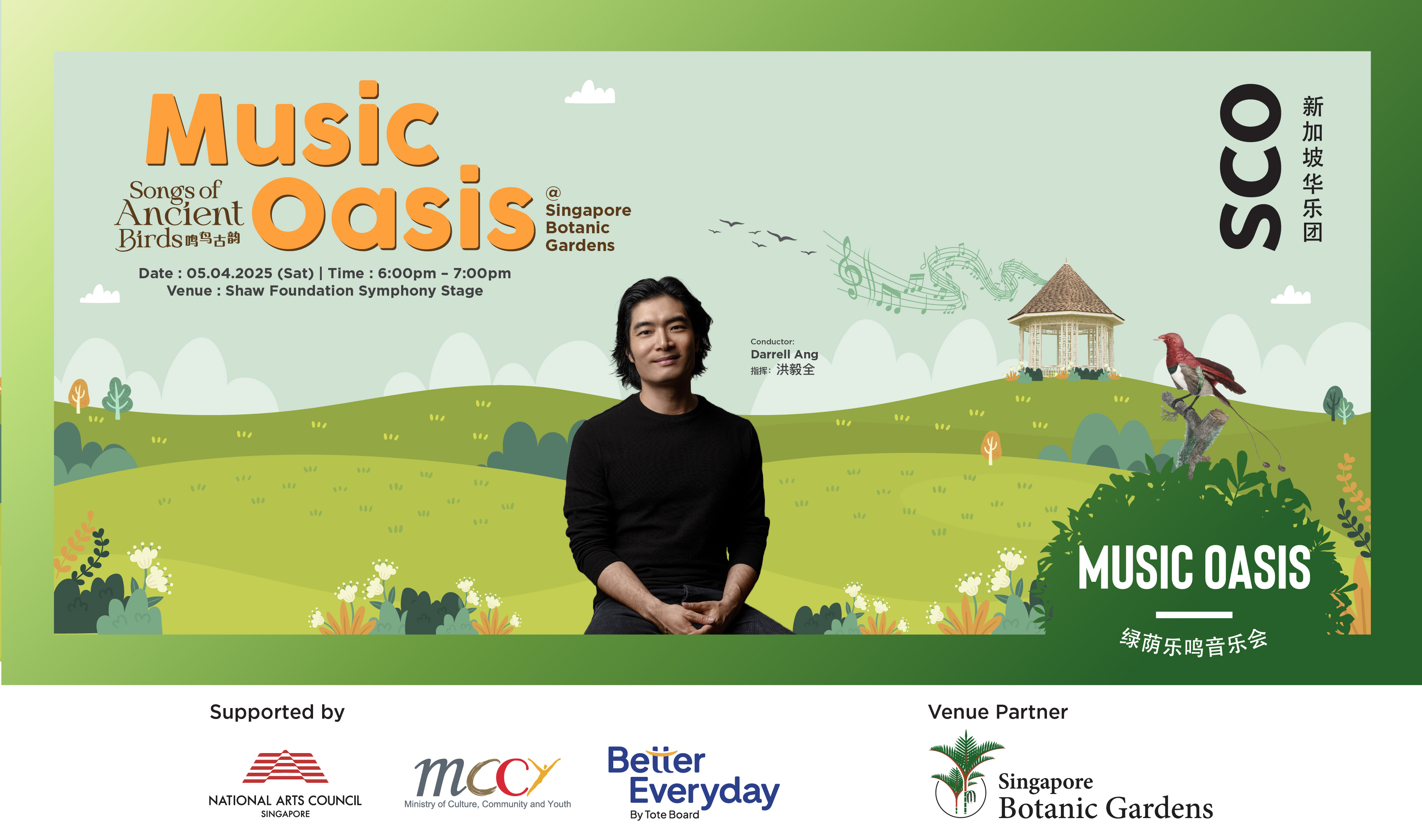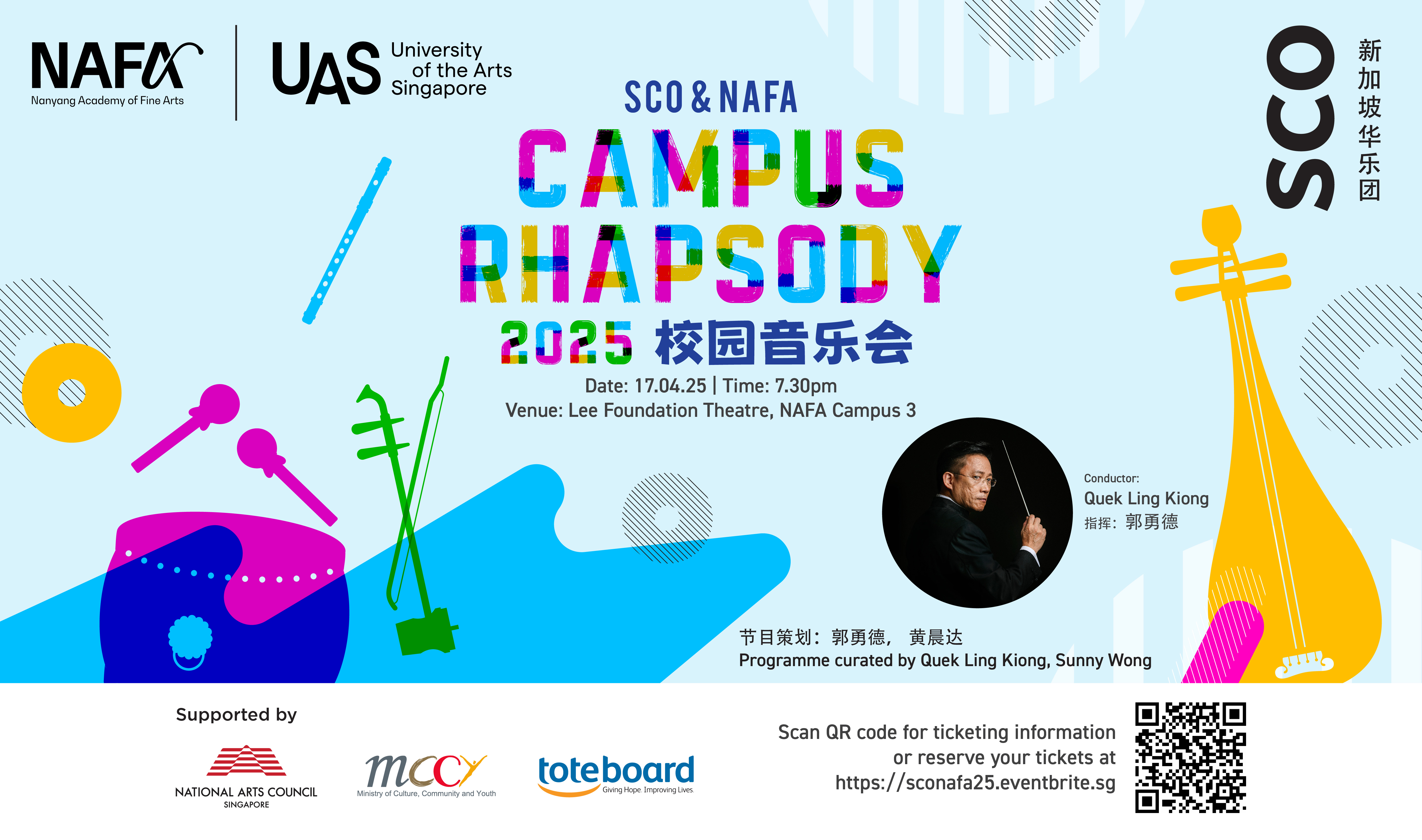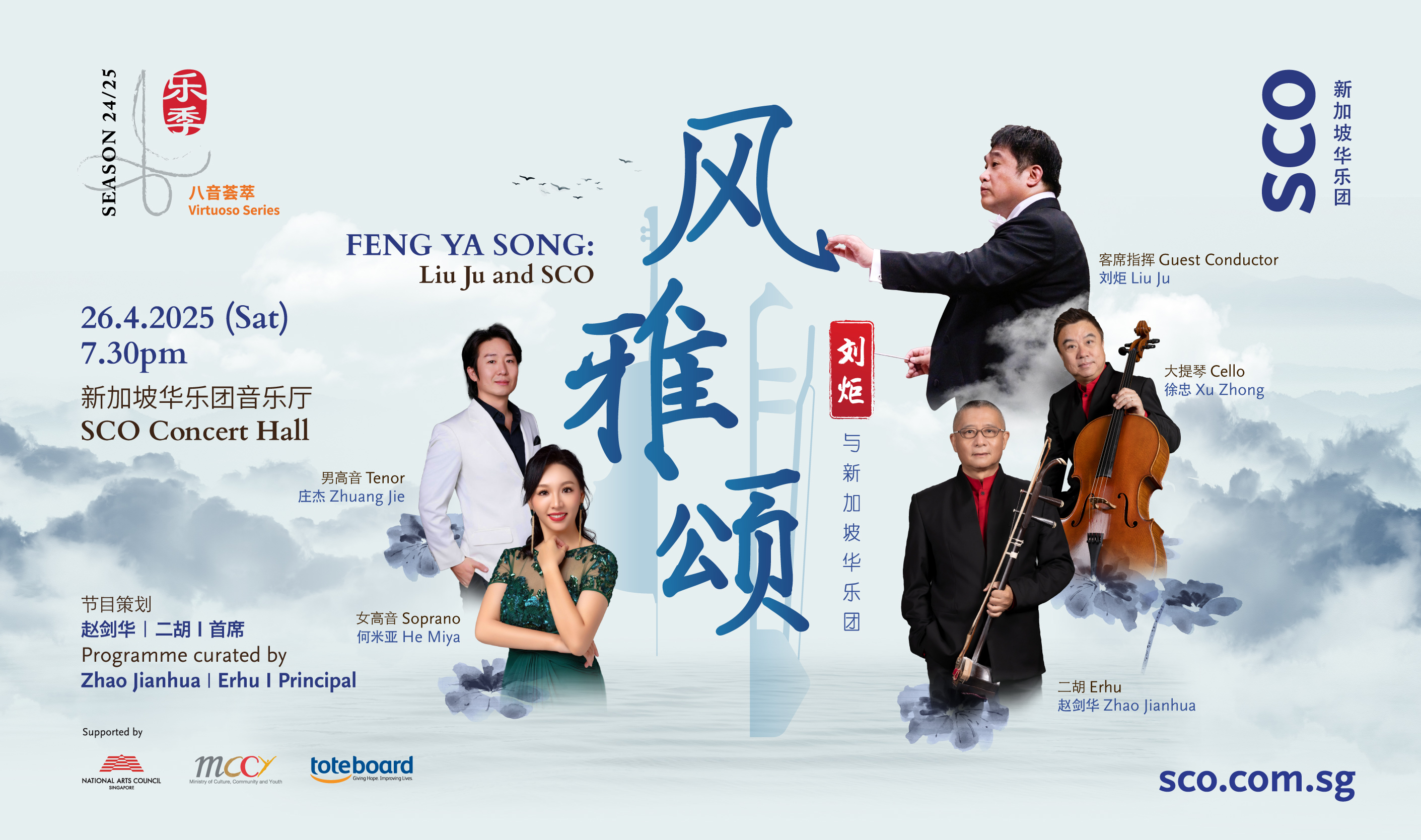On the evening of 30 March 2024, the Singapore Chinese Orchestra (SCO) presented a heartfelt concert "Confluence" at the Suzhou Culture and Arts Centre, located by the picturesque Jinji Lake in Suzhou, China. This concert was not only a tribute to the 30th anniversary of the establishment of Suzhou Industrial Park – the crown jewel of China-Singapore relations, but also an opportunity to showcase the unique and distinctive Nanyang style of SCO to international audiences.
Subsequently on 5 April 2024 evening, the National Centre for the Performing Arts in Beijing, which is situated iconically next to Tiananmen Square, saw a high attendance of distinguished guests that includes scholars, musicians, officials and prominent figures from all walks of life. As a guest performer at the 2nd edition of Spring of Chinese Music Festival, the SCO made its debut at this prestigious concert hall. This concert featured the same “Confluence” programme and attracted nearly 2,000 attendees who were eager to experience the charm of Chinese orchestral music from Singapore.
The repertoire for “Confluence” was curated by Conductor Emeritus Tsung Yeh and it features four pieces, including local compositions rich in Nanyang culture and distinguished works by contemporary Chinese composers. The repertoire exhibits both large-scale symphonic works as well as instrumental concertos that showcase the virtuosity of the SCO's soloists.
The opening piece Tapestries - Time Dances and the final piece Zheng He - Admiral of the Seven Seas were composed by former SCO resident composers Eric Watson and Law Wai Lun, respectively. Both compositions were winning entries in the inaugural Singapore International Competition for Chinese Orchestral Composition in 2006. The competition aimed to attract talented composers to create “Chinese orchestral works with strong Nanyang musical flavour”.
Tapestries - Time Dances incorporates elements of Indonesian Gamelan music and traditional Indian music with a quartal harmony that is better suited to Chinese orchestral tuning, thereby breaks cultural boundaries and explores the possibilities in timbre. The percussion and plucked string sections are particularly notable. A symphonic poem, Zheng He - Admiral of the Seven Seas, was inspired by the voyages of Zheng He, whose travel routes passed through the Straits of Singapore during the Ming Dynasty. Composed by Law Wai Lun and premiered at the 2005 Singapore Arts Festival, this work combines historical themes with elements of romance, drama, vocal performance and Malay dance. For this tour, the composer has specially arranged the piece into three movements: Wandering Spirits, The Voyage and Sea Destiny.
The huqin concerto Fire Ritual, composed by Chinese composer Tan Dun, evolved from the soundtrack he created for the film "1937". The work reflects on war, commemorates the deceased and expresses a longing for peace. This piece flaunts exceptional creativity in terms of spatial and ceremonial experiences; with some of the musicians surround the audience to create the atmosphere of a ritualistic ceremony. Concertmaster Li Baoshun promises to build a soundscape of great emotional depth with his solo passages on the erhu, gaohu and zhonghu.
The pipa concerto Stairway to Heaven performed by principal pipa Yu Jia was composed by Chinese composer Luo Mai Shuo. It was inspired by the ancient Shu culture's Sanxingdui ruins. The piece features the mythical "Celestial Tree" as its central image and illustrates the primitive sun worship of the ancient Shu people. This work displays musical primitivism with the solo sections that showcase exceptional technical skill and artistic brilliance.
Marching onto the global stage with artistic maturity, the China concert tour “Confluence” not only garnered numerous overseas fans for SCO but also created cherished memories for all performers. Tonight, the homecoming musicians are pleased to indulge their fellow Singapore audience with the “Confluence” of Nanyang culture in Chinese orchestral music.
2024年3月30日晚,新加坡华乐团应主办方之邀,在坐落于中国苏州金鸡湖畔的苏州文化艺术中心诚意满满地呈献了一场题为 “乐融狮城” 的音乐会。这既是庆祝中新苏州工业园区开工建设30周年的献礼,也是向中国和国际友人展现新加坡华乐团别具一格,且具有南洋风格的华乐作品的一次精彩亮相。
4月5日晚,毗邻北京天安门的中国国家大剧院高朋满座,作为海外嘉宾参加第二届 “国乐之春” 艺术节的新加坡华乐团首登主办方国家大剧院的音乐厅。这场售罄音乐会以同套曲目,吸引近2000名观众到现场聆听来自南洋的华乐之韵。
“乐融狮城” 由荣誉指挥葉聰策划,四首乐曲包括深具南洋文化内涵的本土作品和中国当代作曲家具有代表性的创作,体裁则涵盖大型管弦交响作品,以及展现华乐团名家风采的器乐协奏曲。
开场曲《挂毯:时光飞舞》和最后一首压场曲《海上第一人—郑和》分别出自两位前驻团作曲家埃里克·沃森(Eric Watson)和罗伟伦之手,并同为2006年由新加坡华乐团举办,以南洋风格为题材的华乐作曲大赛的获奖作品。
《挂毯》吸收了东南亚甘美兰音乐、印度传统音乐的风格,并采用更适合华乐律制的四度叠置和声,打破文化的界限探索音色的可能性,打击乐和弹拨乐在当中也有相当出彩的效果。华乐交响史诗《海上第一人》则取材郑和下西洋的故事,以其航线经过新加坡海峡而得灵感,由罗伟伦创作并首演于2005年新加坡艺术节。这部作品在历史题材中加入爱情线索,并融合戏剧、声乐、华乐交响、马来舞蹈等多重元素。作曲家特别为此次巡演精编为《海路》《海魂》《海缘》三个乐章,以交响诗的形式呈现。
中国作曲家谭盾创作的胡琴协奏曲《火祭》由其为电影《1937》创作的配乐发展而来,作品表达对战争的反思,对死难者的缅怀,以及对和平的祈盼。这部作品充满空间感和仪式感,演奏家将环绕观众席,宛如身临一场祭祀典礼。乐团首席李宝顺将独奏二胡、高胡和中胡三种胡琴,展现极强的情感张力。
琵琶首席俞嘉独奏的协奏曲《天梯》由中国作曲家罗麦朔创作,采风于古蜀文化的三星堆遗址。作品以神话中的通天神树为主体意象,展现川蜀先民对于太阳的原始崇拜。这部作品充满原始主义色彩,独奏部分技术高超、精彩绝伦。
“乐融狮城” 中国巡演是新加坡华乐团从艺术成熟走向国际舞台的一座里程碑,不仅在海外收获 “粉丝” ,也是全体成员一次美好的集体回忆。今晚,新加坡华乐团的音乐家们满载赞誉和回忆,将这些精彩的曲目带回狮城舞台,为家乡观众再现巡演风采。
